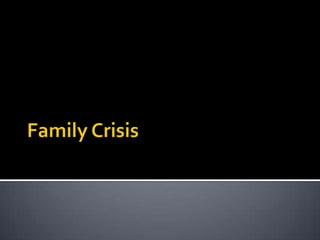
Family crisis
- 2. A family crisis occurs when a family has to change. It is a turning point: things will either get better, or they will get worse. Sometimes, day-to-day hassles can pile up and cause a stress overload. Other events can cause a family crisis:
- 3. Three types: “out-of-the-blue” Developmental crisis Structural crisis
- 4. Something unexpected, suddenly hits your family Includes- death, loss of a job, winning the lottery, house burning down, etc. These changes can be difficult for families because they require the family to deal with many changes. If someone dies others may have to “fill their shoes” while also dealing with the loss. If you win the lottery you have to deal with how to spend the money and this can cause family conflict. Families can adapt well to these crises by supporting one another and being flexible enough to make needed changes.
- 5. Occurs when people get married, have children, have a child start school, have an adolescent going through puberty, have a child leaving home, have parents retiring, aging, and/or dying. Some of these changes are subtle and gradual; others are abrupt and dramatic. These crises are often viewed as “normal events” -- and thus the stress they can place on your family may not be recognized. Families need to be aware that these “normal” developments can cause stress because they challenge us to rearrange our families. To adjust to developmental crisis, families often need to adjust family rules and roles to meet the new abilities of family members.
- 6. Occurs when the family resists changing to meet the demands of developmental or “out of the blue” crisis. Being unable to change can aggravate existing conflict and can lead to many actions that harm you or other family members. Examples include cheating on one’s partner, feeling suicidal, drinking too much (alcoholism), physical and sexual abuse, drug use and divorce. These behaviors are often symptoms of the family’s inability to adapt to change and to solve problems. The family may become so disorganized it is unable to overcome the crisis. When behaviors such as these occur, families often benefit from outside professional help.
- 7. lack cohesiveness and closeness among members. lack positive conflict-management skills fight over "who is right." lack time and positive interaction between the parents. lack family activities and quality time together. experience stressed-out symptoms — including sleeplessness, lack of appetite, disorientation, memory lapses, depression and anxiety. disagree about family goals and how to reach them. are critical and hostile, and blame each other. lack open and safe communication. When families do not communicate well, they have more misunderstandings. lack shared values, rules and roles. In poorly functioning families, members are rigid and will only do what they think they "should" do.
- 8. Do not blame each other within the family Be patient Develop good stress-management skills
- 9. Miss McCabe will draw sticks We will partner up on the computers One can be the writer the other can be the type-guy Jogtheweb.com